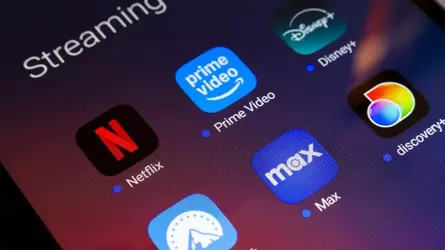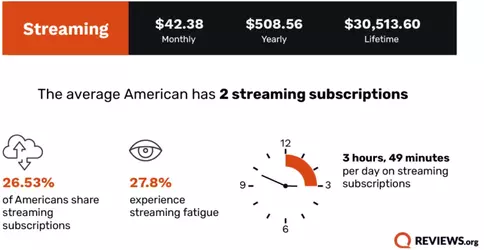
In 2024, the average American grew tired of dedicating so much of their budget to streaming, according to one survey.
The average U.S. citizen spent $42.38 on streaming services each month — which comes out to $508.56 over the course of a full year — according to a December report from Reviews, an internet, streaming, and mobile-focused research organization.
That represents a 23% decline from last year, when Reviews found the average American spent $55.o4 each month on services like Netflix, Disney+, and Max. Reviews’ 2024 report is based on a survey of 1,000 Americans.
What’s behind the big drop in streaming spending?
One reason, according to the report, is that 27.8% of Americans are experiencing “streaming fatigue,” which Reviews defines as “that exact feeling of being overwhelmed with the increasing number of streaming apps.” The report did not say how many of those SVOD-weary citizens ultimately ditched a subscription or two based on their fatigue.

Another potential reason Americans spent less on streaming this year is because many of them are spending more on cable and satellite. The average American spent $89.29 per month — or more than $1,000 per year — on cable/satellite in 2024, up 11% from last year. Nearly 55% of Americans have a cable or satellite subscription, according to Reviews; it is not much of a stretch to believe many of them dropped a streaming service to offset rising TV costs.
A few other takeaways from the report, which you can also see in the graphic above:
The average American has two streaming services and watches nearly four hours of content each day.
And 26.53% of Americans share at least one streaming subscription with their friends or extended family.
The decline in streaming spending comes as ad-supported streaming hit a record high in 2024. A record 43% of streaming subscriptions were ad-supported by the end of Q3, according to Antenna, a market research firm. And between July and September, 56% of new streaming subscriptions were ad-supported — indicating Americans are opting for the cheaper option, even if they have to sit through a few commercials.
Alternatively, it looks like normies are already getting tired of having to pay for too many apps, for the same "goyslop of the month" series. It's like the old timey "paid channels" from cable TV, back in the '90s.
Either way, it's time to set sail to the high seas.
